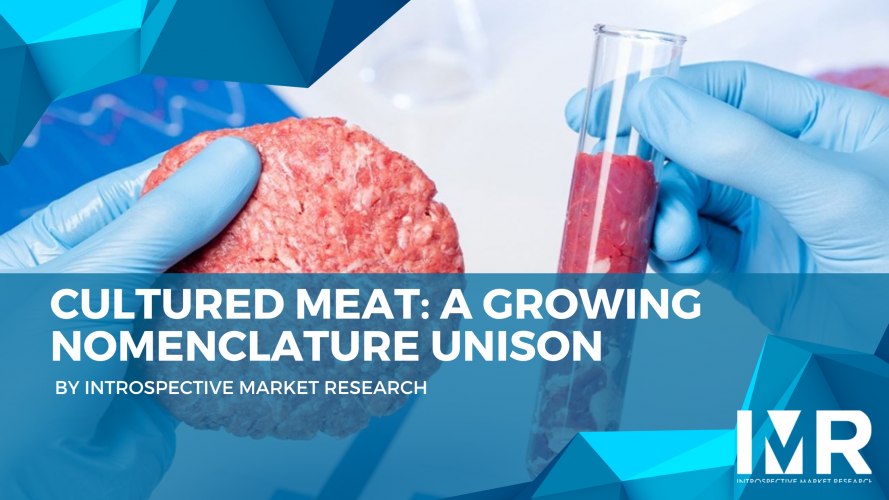
Cultured meat is a lump of meat manufactured by in vitro cell cultures of animal cells. It is a form of cellular agriculture. Cultured meat is developed using tissue engineering techniques traditionally utilized in regenerative medicines. The concept of cultured meat was popularized by Jason Matheny in the early 2000s after he co-authored a paper on cultured meat production and produced New Harvest, the world's first nonprofit organization dedicated to in-vitro meat research.
Cultured meat multiplies in vitro from animal cells has the potential to inscription several of the environmental, ethical, and public health issues related to conventional meat production. Nevertheless, as well as reducing technical challenges to manufacturing cultured meat, producers and promoters of the technology must consider a range of social issues, including consumer appeal and acceptance, regulation, media coverage, religious status, and potential economic effects. Our current meat manufacturing system is resource-intensive, has poor environmental impacts, need animal suffering, and is connected to different public health problems, including animal-transmitted pandemics and antibiotic resistance.
2020 was a year of firsts for the cultivated meat industry culminated with a head of government consuming cultivated meat in Israel and the first commercial sale of cultivated meat in Singapore. The regulatory approval of a cultivated chicken product in Singapore is a good sign for regulatory green lights in other countries.
Funding in the nascent field topped $350 million in 2020, nearly double the previous cumulative investment in the industry. 2020 saw the industry's first Series B funding rounds as well as the first substantial public-sector R&D investment in both the United States and the European Union. Within the substitutes of protein sector (which includes plant-based and fermentation segments), cultivated meat recorded for 14 percent of overall annual private-sector investments.
Cultivated meat is growingly recognized as a valuable research topic by the international scientific community. The public sector is started to invest in cultivated meat research centers, and important research findings are being published in prestigious scientific journals. These efforts to manufacture an academic ecosystem of cultivated meat research are also inspiring a veritable wave of students to pursue research that will speed up commercialization.
Commercial Overview
Entrepreneurial investment in cultivated meat continued at a swift pace in 2020:
- At least 20 new cultivated meat ventures developed.
- The number of startups targeted exclusively on emerging cultivated meat inputs or end products rose to more than 70.
- The number of companies, largely in the life sciences, that have publicly declared a business line in cultivated meat increased to 40.
Technological Aspect
Success in the cultivated meat industry will need emerging economically viable production systems at scale. Fortunately, cultivated meat is introduced by decades of knowledge accumulation in tissue engineering, cell culture, meat science, stem cell biology, fermentation, and chemical and bioprocess engineering. Today, researchers and companies are investing in every conceivable direction to advance the state of the art in this burgeoning field.
Cultivated meat research is taking place in hundreds of companies and academic laboratories around the world, each racing to translate knowledge from physics, chemistry, biology, computer science, and engineering into a new paradigm for producing commodity meat products at an industrial scale.
-
Cell Lines:
Several cell types can be used to manufacture cultivated meat. Further research is required to make cell lines more accessible, study the potential of each cell type, and determine how the selection of cell type and properties influences downstream process considerations.
-
Cell Culture Media:
Cell culture media contains the nutrients and growth factors that cells require to grow outside the body. Research on optimized formulations, food-grade, and animal-free components, and recycling technologies are required to make cell culture media significantly more affordable.
-
Scaffolding:
Scaffolds are 3D cell culture platforms that aim to summarize the natural 3D microenvironment of cells, which is important to facilitating more natural cell behavior and tissue formation. More research is needed to uncover the best materials and methods for optimizing meat traits.
-
Bioprocess Design:
Bioprocess design carries the key to unlocking large-scale production of cultivated meat. Additional research is required to determine the best-suited bioreactors for different cell types and products, as well as how future facilities will be operated.
Government And Regulation
Global leadership in the regulation of cultivated meat is probably to come first from economies committed to the growth of the sector. It is essential that companies and governments' production and regulation work in concert to successfully develop effective regulatory regimes. Singapore's groundbreaking approval of Eat Just's cultivated chicken product puts the Asia Pacific region at the leading edge as an architect of novel and progressive oversight of cultivated meat.
-
European Union
In May 2020, the European Commission issued its Farm to Fork Strategy, identifying its ambition to move toward a more sustainable and healthy food system. Even though the strategy does not explicitly mention cultivated meat, it endorses increased funding for research and innovation in the alternative protein sector.
Cultivated meat when manufactured without genetic modification is controlled under the novel food regulation of the European Union. Companies must apply to the European Commission for premarket authorization of their products. The authorization procedure includes a safety evaluation by the European Food Safety Authority (EFSA). Premarket authorization is managed centrally, meaning that once the European Commission and representatives from the EU member states approve a product, the approval applies across all 27 member states.
New EU rules came into effect in March 2021 that enable limited resubmission consultations between companies and EFSA. Additionally, companies seeking to apply for novel foods authorization are compelled to notify the regulator of any study commissioned in preparation of an application.
-
United States
In April, the U.S. Government Accountability Office (GAO) issued a report on the regulation of cultivated meat. The GAO's recommendations for interagency collaboration, incorporating assigning key oversight roles and establishing milestones and metrics for tracking progress, could strengthen the collaborative work of the Food and Drug Administration (FDA) and the U.S. Department of Agriculture (USDA). The recommendations may also accelerate the development of a regulatory framework that will ensure consumer safety and well-crafted food policies.
In July, the FDA and USDA Food Safety and Inspection Service released an on-demand webinar on their respective duties: Roles and Responsibilities for Cultured Animal Cell Human and Animal Food Products. The webinar covered the allocation of oversight responsibilities between the USDA and FDA as laid out in their March 2019 formal agreement. The FDA will oversee cell collection/banking and all cultivation inputs and processes up through the moment of biomass "harvest" from bioreactors. The USDA will regulate further processing and labeling for terrestrial meats, while the FDA will have jurisdiction over most seafood products through processing and labeling stages. The USDA also verified claims by staff that it plans to "develop regulatory requirements" for labels and solicit public comments for products subject to its labeling jurisdiction. The FDA said it does not plan to issue a rule proposal or new guidance on preharvest phases but views its existing guidance as sufficient.
A federal court in Arkansas temporarily encouraged the state's label censorship law, holding that it probably violates constitutional free-speech protections. The judge is now considering whether to make the injunction permanent or to strike down the law.
In November, a federal appeals court heard a similar challenge to a label censorship law in Missouri from GFI and Tofurky. GFI is asking the court to hold that the law cannot be enforced while the lawsuit proceeds. A decision is expected in the first half of 2021.
Amplifications of Cellular Agriculture Nonprofits
In mid-2020, several nonprofits connected forces to form the International Cellular Agriculture Nonprofit Consortium. The consortium comprises Cellular Agriculture Germany, Cellular Agriculture UK, Cellular Agriculture New Zealand, Cellular Agriculture Canada, Cellular Agriculture Australia, Cellular Agriculture Institute of the Commons (Japan), Cultivate, Cellular Agriculture France, New Harvest, and the multinational Cellular Agriculture Society. This combined works to raise regional awareness of opportunities and challenges in cultivated meat and energize local decision-makers around prioritizing alternative protein development.
Conclusion And Major Developments For The Cultured Meat Market
Conquering even a fraction of the global meat demand is a colossal opportunity for cultivated meat companies. Doing so will need a significant deployment of scientific progress, infrastructure development, investment, and—crucially—a robust ecosystem to support the industry's growth. In light of this, 2020 was a hallmark year for the field of cultivated meat. The industry made remarkable progress in scaling the technology, desilting the industry via commercial partnerships and carving out a key regulatory precedent. And 2020 is but a prelude to the ongoing developments of 2021 and beyond.
- In September 2021, Leonardo DiCaprio is built on a yet-another environment-focused initiative to his plate. The Hollywood actor and climate activist became an investor and advisor in two cultured meat startups as, Netherlands-based Mosa Meat and Israel's Aleph Farms. Both organizations are part of the pack of startups looking to offset the environmental costs of traditional meat by rising the meat without the animals.
- In December 2020, the cultivated meat industry cleared a critical milestone when Eat Just received regulatory approval to sell its cultivated chicken product in Singapore. Eat Just made the first commercial sale in 1880, its restaurant partner in the country. 1880 sold Eat Just's cultivated chicken bites to consumers for the very first time via a series of invitation-only dinners in December before adding the product to the menu for all diners in early 2021
- In January 2020, Mosa Meat partnered with Nutreco, an animal nutrition company for the supply of nutrient-filled liquid needed for non-vegetarian food growth. Mosa Meat also acquired crucial investments from Nutreco and Lowercarbon Capital to create the product on a large scale. The company aims to introduce cultured hamburgers in Europe by 2022.
- Avant Meats, Hong Kong's sole cultivated meat company, unveiled its fish fillet in a cooking demonstration with a renowned local chef.
The Chicken, from SuperMeat, is a hybrid restaurant concept and pilot plant. Essentially a test kitchen, The Chicken is an innovative concept that brings the consumer closer to both the manufacture and the organoleptic experience of cultivated meat.






